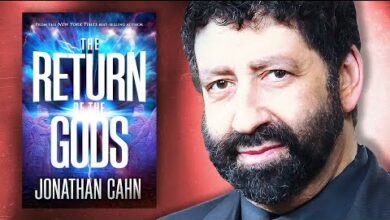The Prisoner Who Became King | Jonathan Cahn Sermon
The Prisoner Who Became King | Jonathan Cahn Sermon
In this powerful message, Jonathan Cahn reveals the profound prophetic parallels between Joseph—the prisoner who rose to rule Egypt—and Messiah, Jesus (Yeshua), the Savior of the world. Through Scripture and ancient Jewish and Egyptian meanings, Cahn unveils how Joseph’s journey from the pit to the palace mirrors the redemptive mission of Christ.
Joseph was more than just a dreamer or interpreter—he was a life-sustainer. When famine threatened Egypt and the surrounding nations, Joseph provided bread that saved multitudes from death. In the same way, Messiah is our Bread of Life. He nourishes and sustains the soul—not just once, but daily. Those who partake of Him will never hunger again.
Cahn highlights an ancient rabbinical text which states that “the faces of the angels in heaven glow with joy” when the Elect One rises. Just as Joseph was elevated to stand before Pharaoh and entrusted with saving the land, Jesus was exalted to the right hand of the Father to bring salvation to the world.
Prophetic Parallel: Joseph and Jesus
Joseph endured betrayal, humiliation, and prison, but it was all part of God’s divine plan. He was being prepared to carry the weight of the kingdom. Likewise, Jesus descended to the lowest depths—death on a cross—but was raised in glory. Philippians says that God exalted Him and gave Him the Name above every name, so that every knee should bow and every tongue confess that Jesus Christ is Lord.
When Pharaoh saw the Spirit of God in Joseph, he placed all of Egypt under his authority. He gave him his signet ring, dressed him in fine linen, and declared that no one could lift a hand or foot in Egypt without Joseph’s word. This foreshadows Christ’s authority. After the resurrection, Jesus declared, “All authority in heaven and on earth has been given to Me. Therefore, go…”
The Mystery of the Name: Zaphenath-Paneah
Pharaoh gave Joseph a new name: Zaphenath-Paneah—a mystery with multiple prophetic meanings in different languages:
In Hebrew, according to the historian Josephus, it means “Revealer of Secrets.” Just as Joseph unveiled hidden truths, Messiah reveals the deep mysteries of God. He invites us to the secret place, where He opens our eyes to things unseen.
In Egyptian, one rendering means “He lives.” Another interpretation expands it to “God speaks and he lives.” This foreshadows the resurrection. Jesus, who was crucified, rose again—He lives. And if you know Him, He lives in you.
Another meaning is “Man of Bread” or “The Bread Man.” Joseph gave Egypt bread; Jesus said, “I am the Bread of Life.” He is the one who truly satisfies and sustains.
It also means “The One Who Sustains Life.” Joseph preserved life during the famine. Messiah preserves our lives eternally.
Most powerfully, in Coptic-Egyptian, the name can be translated as “Savior of the World.” That is exactly what Messiah is. His name, Yeshua (Jesus), literally means “God is Salvation.”
Every aspect of Joseph’s story points to Jesus—His suffering, His exaltation, His mission to save both the nations and His own people, Israel.
The Name Above Every Name
As Cahn emphasizes, God gave Jesus the highest name. At the name of Yeshua, every knee will bow—in heaven, on earth, and under the earth. He is the Revealer of Secrets, the Bread of Life, the Sustainer of Souls, and the Savior of the World.
Final Note:
Jonathan Cahn ends with a teaser for his latest prophetic revelation: The Dragon’s Prophecy. This new book explores Israel, the dark resurrection, and what lies ahead in the last days. Available wherever books are sold.
Keywords for SEO:
Joseph and Jesus parallel, prophetic sermon 2025, Jonathan Cahn prisoner to king, Zaphenath-Paneah meaning, Jesus Savior of the world, Joseph Messiah foreshadowing, Bread of Life sermon, Jonathan Cahn new book Dragon’s Prophecy, Egypt famine prophecy, Jesus revealed in Genesis
Would you like this summary shortened for YouTube description or expanded for a blog article?
